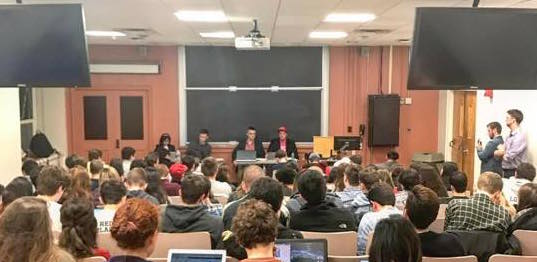By Maggie Dolan, news staff
The Northeastern University College Democrats (NUCD) beat their Republican counterparts in an hour-long debate about health care Thursday night in Richards Hall.
Two members of each club competed in a series of speeches and debates moderated by the Northeastern University Debate Society, who voted 3-2 in favor of NUCD. After brief opening speeches by each side, there were three rounds of debates. Each side had four minutes to speak and and another four minutes to present counter arguments per round before presenting their closing arguments.
The debate focused on three specific issues in health care: Ideal policies to balance the needs of impacted groups, rising health care premiums in the United States and the future of American health care.
The debate society credited the Democrats’ win to their argument that the Affordable Care Act (ACA), commonly known as “Obamacare,” is not perfect but has helped many people who otherwise had no health care at all.
“There are certain groups of people that would literally not be able to get coverage or would have extremely expensive coverage that is unaffordable,” said Monisha Reginald, the NUCD co-president and a senior math and economics combined major.
The Northeastern University College Republicans (NUCR) argued that the ACA reduces competition for insurance companies and leaves consumers with little, if any, choice in their providers.
“‘Obamacare’ creates an environment where insurance companies drop out of the marketplace,” said Nathan Kotler, NUCR secretary and a third-year mathematics major. “It encourages monopolies where one or two companies have complete control.”
College Democrats said the ACA should be amended in a bipartisan conversation so it can improve and remain in place.
“There are real benefits being observed every day for millions of Americans because of the Affordable Care Act,” said Shane Godek, NUCD member and a sophomore political science and economics combined major. “Starting from scratch makes no sense at all.”
NUCD members argued that the ACA made health care more accessible to low-income Americans, women, people with pre-existing health conditions and military veterans.
In their counterargument, college Republicans said—undisputed by the Democrats—that the federal government manipulated data to give excessive credit to the number of people the ACA has helped.
“Twenty million people are now issued is a lie,” Kotler said. “It’s actually several million people less than what the Democrats think. It would be unequivocally false to say that the number of Americans who have gained health insurance is due to the effectiveness of the ‘Obamacare’ exchange.”
In its discussion of rising premiums in health care, college Republicans argued that, instead of providing unemployed Americans with government-subsidized health insurance, legislators and the executive branch should focus on job growth. When people are brought into the job market, NUCR members said, their employers cover insurance costs, so they do not need to pay high ACA premiums.
NUCD member Sridevi Dayanandan said the health of individuals must improve before economic growth can occur.
“Yes, I agree, a robust economy is important,” Dayanandan said. “But having a healthy population citizenry is necessary in order to have a functioning economy. What is an economy without the people?”
In a final portion of the debate regarding the future of the health care system, college Republicans argued that healthy citizens should be allowed to save money, tax-free, to be used when health challenges occur later in life.
College Democrats members advocated for reforms on existing health care legislation, including public option, an idea removed from the initial ACA bill that aims to reduce premiums throughout the health insurance field.
“Public option would allow the government to essentially step into markets where there is a small amount of competition and provide a health care plan that offers a premium five to seven percent lower than the only other option in that market,” Godek said. “Creating a sense of competition and forcing other insurers to compete against something.”
After what Reginald said was the NU Debate Society’s own argument in choosing a winner of the closely-matched debate, they gave NUCD the title.
“Some of the problems in terms of the quality of the care are not really comparative to people not having health care,” Reginald said.
Photo courtesy Northeastern University College Democrats









